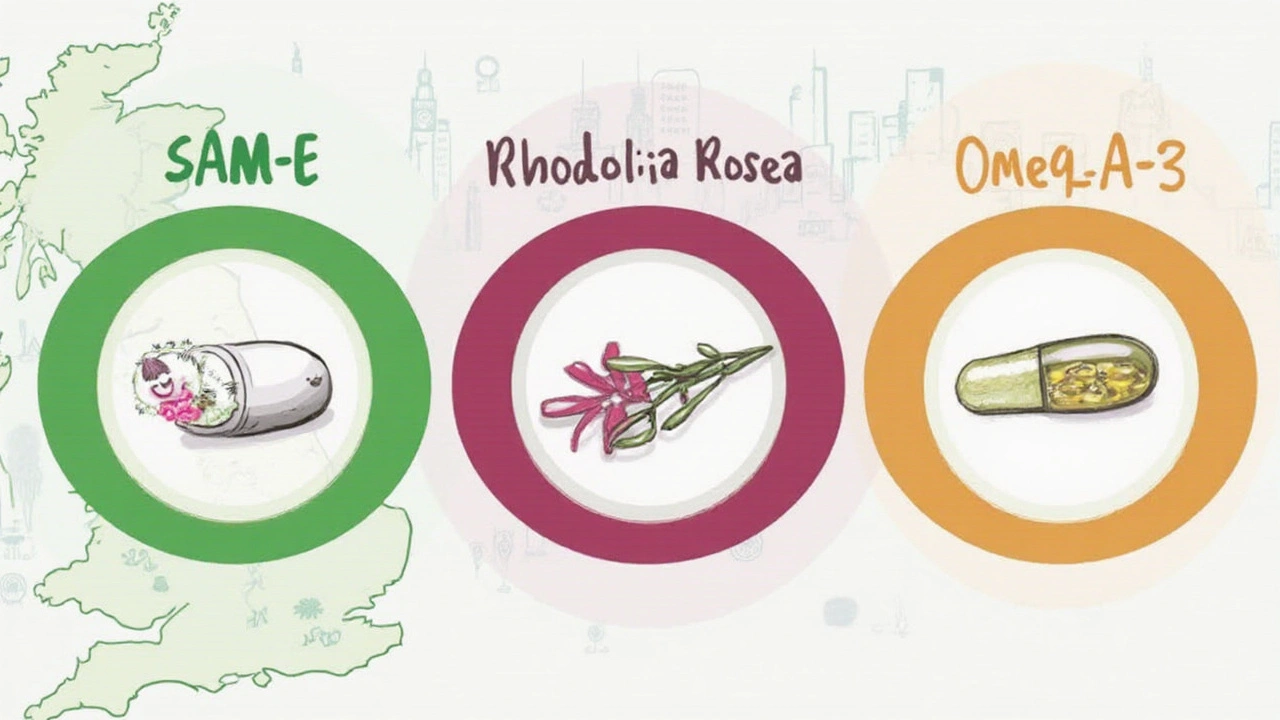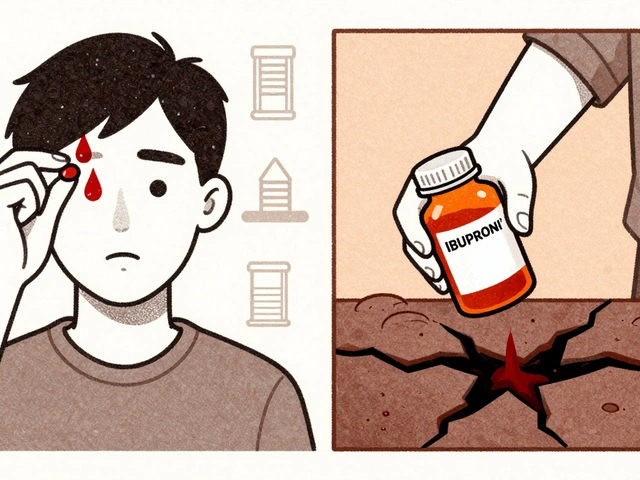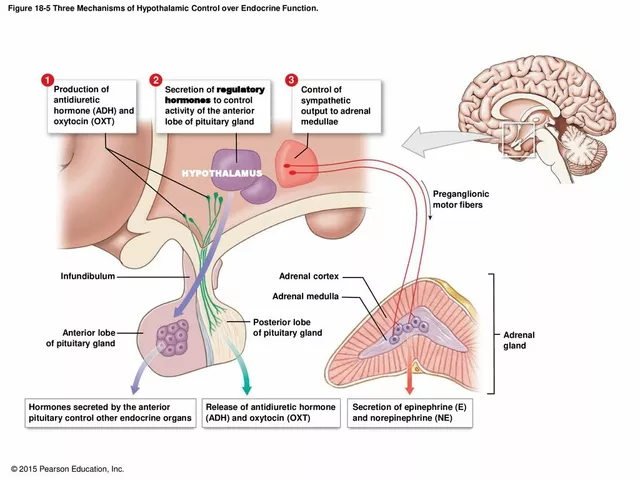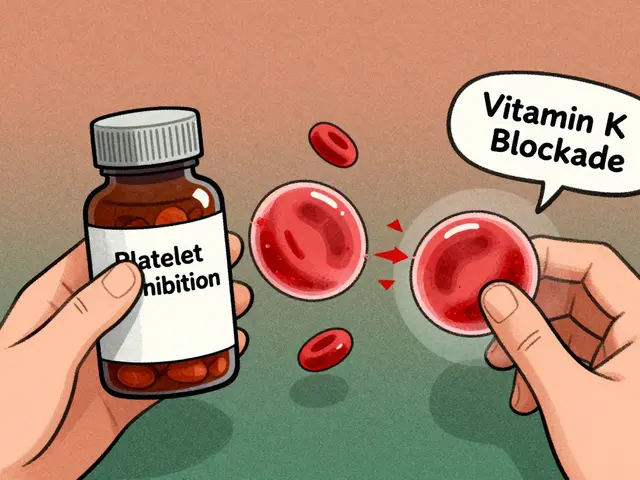What Exactly Are Natural Mood-Boosting Supplements?
If you’ve ever had one of those days when even your morning coffee, your dog's goofy antics, or your kid’s wild stories can’t shake a low mood, you’re not alone. While everyday stress and gloom hit us all—often thanks to lack of sleep, crazy schedules, or just plain life—sometimes you want help beyond the usual suspects. Pharmacies are packed with bright bottles promising calm, focus, and happiness. The catch? Not all so-called natural mood boosters actually do much. That’s why it’s worth sorting the hype from the real science, especially when you want something gentle, safe, and actually effective.
Let’s look at three natural supplements with research to back up their mood-boosting claims: SAM-e, Rhodiola rosea, and omega-3 fatty acids. These aren’t random herbs or vitamins with sketchy origins. Each has been studied in real human trials. Some days, when exhaustion’s at its peak and my own brain feels like cotton wool (usually after one of the kids is up half the night), I’m grateful these options exist. But how do they actually help, and what’s the real proof?
SAM-e—short for S-adenosylmethionine—has been used medically in parts of Europe for decades. Rhodiola, a hardy root from Siberian mountains, is best known as an “adaptogen”—supposedly helping your body handle stress. Omega-3s are healthy fats found in fish and some plants, and if you’re a seafood hater, you’ve probably heard a doctor say you still need them. Each one works differently, which means one might be more helpful for you than another. Think of them as tools in a toolbox; knowing which tool to reach for makes a huge difference.
Plenty of people now look for natural support as alternatives to prescription antidepressants, or as a way to smooth the edges while tapering off meds. If you’re exploring choices similar to Wellbutrin, these natural options can sometimes play a supporting role. But remember: supplements aren’t magic. They need the right expectations (and occasionally a little patience).
SAM-e: Europe’s Open Secret for Lifting Low Moods
SAM-e is one of those supplements you might stumble upon and wonder, “Is this real, or just vitamin shop fluff?” Turns out, SAM-e isn’t just a wellness trend—it’s been prescribed by doctors in Italy, Germany, and Spain for more than 30 years for mood issues, joint pain, and even liver support. What’s wild is that it’s actually a molecule your body makes naturally. Your brain uses it to build neurotransmitters like serotonin and dopamine—the chemicals that help you feel happy, motivated, and focused. When SAM-e levels drop (due to age, stress, or chronic illness), those feel-good chemicals may plummet too.
The big question: does swallowing extra SAM-e in a pill actually lift your mood? Scientists have given it an honest shot in several studies. A standout 2016 review published in the Journal of Clinical Psychiatry analyzed over a dozen trials. The verdict: people who took SAM-e saw a noticeable improvement in depression symptoms—especially folks who hadn’t responded well to standard antidepressants. Some studies even found it worked about as well as certain prescription SSRIs, but often with fewer side effects like weight gain or sexual problems. That’s a pretty solid vote of confidence.
One of the cool things is how quickly some people respond. A handful of trials showed mood lifts in as little as a week, though it usually takes two to four weeks for the full effect. If you’re curious about adding it to your routine, typical doses start at 400 mg per day, sometimes bumping up to 800 or even 1600 mg daily if needed (split between morning and midday—don’t take it late or you might end up wired like you drank four espressos). My one bit of real-world wisdom: SAM-e should always be taken on an empty stomach—otherwise, it seems to work a lot less.
Side effects are rare, but some people can get an upset stomach, dry mouth, mild anxiety, or restlessness. Folks with bipolar disorder should skip it, since there’s a risk of mania. Cost might be a downside—it’s pricier than many other supplements. If you’re buying it, go for coated tablets from reputable brands; SAM-e breaks down fast in air or light. And since everyone’s biology is different, keep your expectations realistic—some feel a dramatic shift, others only a slight improvement.

Rhodiola Rosea: The Stress-Defying Herb From the Mountains
Rhodiola rosea sounds like something mythical, but it’s a rough-and-tumble root with an actual survival superpower: it grows in some of the coldest, toughest places on earth. Vikings supposedly chewed it to boost endurance, and Russian astronauts packed it to help with stress overload. The reason it keeps popping up in supplement aisles is for its reputation as an “adaptogen”—meaning it might help your system reset after a stressful period, whether it’s work deadlines, family drama, or just too many nights falling asleep on the sofa after chasing a puppy and a toddler around.
What makes rhodiola interesting from a science angle? For starters, clinical trials show it appears to help with fatigue, anxiety, and mild-to-moderate depression. A 2022 randomized controlled trial out of Sweden found people who took rhodiola for eight weeks had a clear reduction in symptoms of stress and “burnout syndrome” compared to a placebo group. Another study compared rhodiola to sertraline (Zoloft) and found that both improved mild depression, although rhodiola’s effects kicked in a little slower—but with almost no side effects reported. That’s a trade-off many people are happy to make, especially if they’re sensitive to prescription meds.
Rhodiola works by tinkering with your body’s stress response—including the hormones adrenaline and cortisol. It seems to help balance these out, making you more resilient after sleepless nights or emotional rollercoasters. Some folks describe it as a gentle “mental energy booster” rather than a jolt. My own brain fog has eased noticeably after a week or two of 200–400 mg daily, especially during long winter months. If you try it, take it in the early part of the day—too late, and you might find yourself lying awake while your cat pounces on your toes at 2 a.m.
The side effect list is short: occasional jitteriness or dry mouth. One huge plus: no withdrawal symptoms reported in real-world use. The biggest pitfall? Quality. Rhodiola’s popularity has led to cheap imports with low active ingredients—or even fake products. Check for brands that specify at least 3% rosavins and 1% salidroside, the two main bioactive compounds. And don’t expect instant fireworks; benefits come on slow and steady, often after a week or two, but then stick around with regular use.
If you’re curious how it compares to other mood supplements or even prescription options, look up reviews and discussion threads online—rhodiola is one of those rare herbs people seem genuinely excited to share their success stories about.
Omega-3 Fatty Acids: Brain Food With a Serious Side Benefit
From fish oil capsules to flaxseed and chia puddings, omega-3s have made their way into almost every “wellness” conversation—and for good reason. These essential fats, mainly EPA (eicosapentaenoic acid) and DHA (docosahexaenoic acid), are massive for brain development, nerve function, and keeping inflammation in check. But what does that mean for your mood? A lot, actually.
Multiple research teams have dug into the connection between omega-3 intake and mental wellbeing. A large 2023 meta-analysis looked at data from over 25 studies on adults with depression. The cool pattern: people with the lowest omega-3 levels were significantly more likely to experience frequent low moods. What’s more, supplementing with omega-3s—especially formulas heavy on EPA—led to moderate improvements in symptoms compared to placebo, sometimes performing nearly as well as some common antidepressants (without the risk of weight gain or agitation).
Why do omega-3s work this way? These fats make up a huge part of your cell membranes, especially in the brain. Higher EPA seems to regulate inflammation and boost the fluidity of brain cells, which may help neurotransmitters like serotonin and dopamine do their thing. Several trials found the sweet spot for mental health seems to be around 1000–2000 mg of combined EPA/DHA per day, ideally with more EPA than DHA. And while fish oil blends lead the pack (especially wild-caught anchovy, sardine, or salmon oil), plant-based sources like algal oil work if you’re vegetarian or just can’t stomach fish burps. If your pet eats better omega-3 than you do (looking at you, Percival), maybe it’s time to upgrade your own diet too.
Here’s a quick table with common foods and their omega-3 content (per 100g):
| Food | EPA/DHA Content (mg) |
|---|---|
| Wild salmon | 2200 |
| Sardines | 1480 |
| Farmed salmon | 1100 |
| Mackerel | 1400 |
| Chia seeds | 490 (ALA only) |
| Flaxseed oil | 7200 (ALA only) |
| Walnuts | 910 (ALA only) |
ALA is the plant form of omega-3, but your body doesn’t convert it to EPA/DHA very efficiently—so if you don’t eat fish, try a good algae-based supplement. Most people report fewer side effects with omega-3s than with many mood meds. Sometimes you might get mild stomach upset or fishy aftertaste, but that’s about it. For best absorption, take your dose with a meal. If you’re on blood thinners or have a bleeding disorder, talk to your doctor—it can slightly thin the blood at high doses.
Don’t expect instant magic—most people notice improvements after about 6–12 weeks of daily use. Along the way, you’ll likely get side benefits for your heart, eyes, and even joints. Omega-3s are the definition of “no-brainer” for anyone curious about natural mood support.

How to Use These Supplements Wisely (and Get the Most Out of Them)
With shelves crammed full of “miracle” supplements, what actually makes a difference? The truth is, finding what works best for your body sometimes takes a little trial-and-error. It helps to start small and pay attention to both the subtle and obvious changes in your energy, motivation, and stress tolerance. With SAM-e, it’s about catching the right dose—too little might not lift your spirits, too much and you might get jittery. Rhodiola is the steady tortoise, building resilience and stamina week by week. Omega-3s are the slow-burners, nudging your mood (and focus) as your brain gets “fed” the right fats over weeks or months.
If you’re juggling work, kids, and everyday life (which, let’s be honest, is most of us), consistency makes the biggest impact. Don’t expect any supplement to work wonders overnight—think in terms of weeks. And if you combine these with basics like solid sleep, some movement, regular meals, and downtime (even if that’s five minutes hiding in the laundry room), you’ll get a bigger boost. In my house, the calendar runs on “kid chaos time”, making reminders or timers on your phone a total lifesaver for not missing doses.
Another tip? Track your mood as you go. Use a journal, an app, or even a sticky note on the fridge. Sometimes the shifts are subtle at first—less ruminating, easier mornings, fewer energy crashes. And if you’re on a prescription antidepressant or thinking about swapping to solutions similar to Wellbutrin, always talk it through with your doctor before making changes. Natural supplements can have real interactions and side effects, especially if mixed with other meds.
- Start with one new supplement at a time, so you know what’s working (or not).
- Always check the best time of day for each supplement—some improve energy and mess with sleep if taken too late.
- Stick to trusted brands with third-party quality testing. More expensive sometimes means safer and more effective.
- Pair mood supplements with daily basics: sunlight, movement, a little time outdoors with your dog (Percival approves), and less doom-scrolling at night.
- If you feel “off,” stop the supplement and give your doctor a call.
- Don’t be afraid to experiment with food sources (especially omega-3 rich fish) instead of always reaching for a pill.
The search for natural mood boosts doesn’t have to feel like guesswork or wishful thinking. With enough research-backed options out there now, you can stack the odds in your favor. Sometimes it’s a small bottle making a big difference—and sometimes it’s your pet purr-fectly interrupting a rough day with some much-needed distraction. Either way, it never hurts to give yourself every tool you can.








17 comments
Michael Lynch
Been taking omega-3s for a year now. Not magic, but my brain fog lifted like someone pulled a curtain. No more 3 p.m. crashes. Also, my knees don't creak like an old door anymore. Weird side benefit.
Ashley Tucker
Of course the government doesn't want you to know this. Big Pharma pays scientists to bury the truth. Rhodiola? It's been banned in 14 countries. They just call it 'herbal wellness' to hide the real agenda.
Allen Jones
Bro I tried SAM-e for 3 days and my heart started racing like I'd chugged 12 Red Bulls. Then I saw a Reddit post from a guy in Canada who said his neighbor's dog died after taking it. Coincidence? I think not. 🤨
jackie cote
Consistency matters more than the supplement. Sleep, sunlight, movement. These are the real triad. Supplements are garnish. Don't mistake the spice for the meal.
ANDREA SCIACCA
So you're telling me the same chemicals that make you feel good are ALSO in your body naturally? That's literally how the universe works. But they want you to buy a $40 bottle because capitalism. I'm not buying it. I'm going to stare at the sun for 20 minutes instead. Free. Natural. Revolutionary.
Camille Mavibas
Omega-3s changed my life. Seriously. I was crying in the shower every morning. Now I just make pancakes and laugh at my cat. 🥞😂 Took 8 weeks. Worth it.
Shubham Singh
You people are so naive. You think these supplements are safe? They're made in labs owned by the same corporations that sell antidepressants. The whole system is designed to keep you dependent. Even your 'natural' choices are engineered. Wake up.
Hollis Hamon
I took rhodiola for six months. Didn't notice much. But I started walking every morning. Maybe it was the walk. Or maybe the quiet. Or maybe I just needed to stop scrolling. I'm not sure anymore. But I feel better.
Adam Walter
Let’s get real: SAM-e is a methyl donor. That’s biochemistry 101. Your brain uses methyl groups to synthesize neurotransmitters. Low SAM-e? Low serotonin. It’s not mystical-it’s metabolic. And yes, the 2016 meta-analysis is solid. But here’s the kicker: it only works if your methylation pathway isn’t broken by MTHFR mutations. Get tested. Don’t just pop pills like candy. 🧬
Gurupriya Dutta
I've been on antidepressants for years. Tried omega-3s as an add-on. Felt a little calmer. Not a miracle, but it helped. I'm grateful for people sharing this. It makes me feel less alone.
caroline howard
Wow, someone actually wrote a post without saying 'just be positive' or 'meditate more.' Refreshing. I'm trying rhodiola next week. Fingers crossed.
Melissa Thompson
Omega-3s? You mean the fish oil that’s been proven to increase prostate cancer risk in men over 50? And SAM-e? It’s been linked to increased suicidal ideation in adolescents. Why are you promoting unregulated, poorly studied substances as alternatives to FDA-approved meds? This is dangerous.
Rika Nokashi
I read this whole thing and I’m still confused. Are we talking about depression or just feeling tired? I think people confuse low energy with clinical depression. Also, why do you keep mentioning dogs? I don’t have a dog. I have a cat. And cats don’t care if you’re sad. They just sit on your keyboard. So what’s the point? Also, I tried rhodiola and it made me feel like I was being chased by bees. Not recommended.
Don Moore
Always consult a licensed physician before altering your treatment plan. Supplements are not substitutes for professional mental health care. Evidence-based interventions remain the gold standard. Please prioritize safety over anecdote.
Austin Levine
My therapist said omega-3s help. I started taking them. Two months later, I didn’t feel different. But I also started biking to work. Maybe that’s what helped. Or maybe nothing did. Either way, I feel okay now.
Lee Lee
Did you know that SAM-e was developed by the CIA during Project MKUltra? They were trying to create mood-altering compounds for mind control. The formula leaked. Now it's in Walmart. Coincidence? I think not. The government wants you to think it's 'natural' so you won't question the real agenda. Also, your dog doesn't love you. He's programmed to.
Matthew King
took sam-e for a week. felt like i'd been punched in the brain. stopped. now i just drink coffee and yell at my plants. they yell back. it's fine.